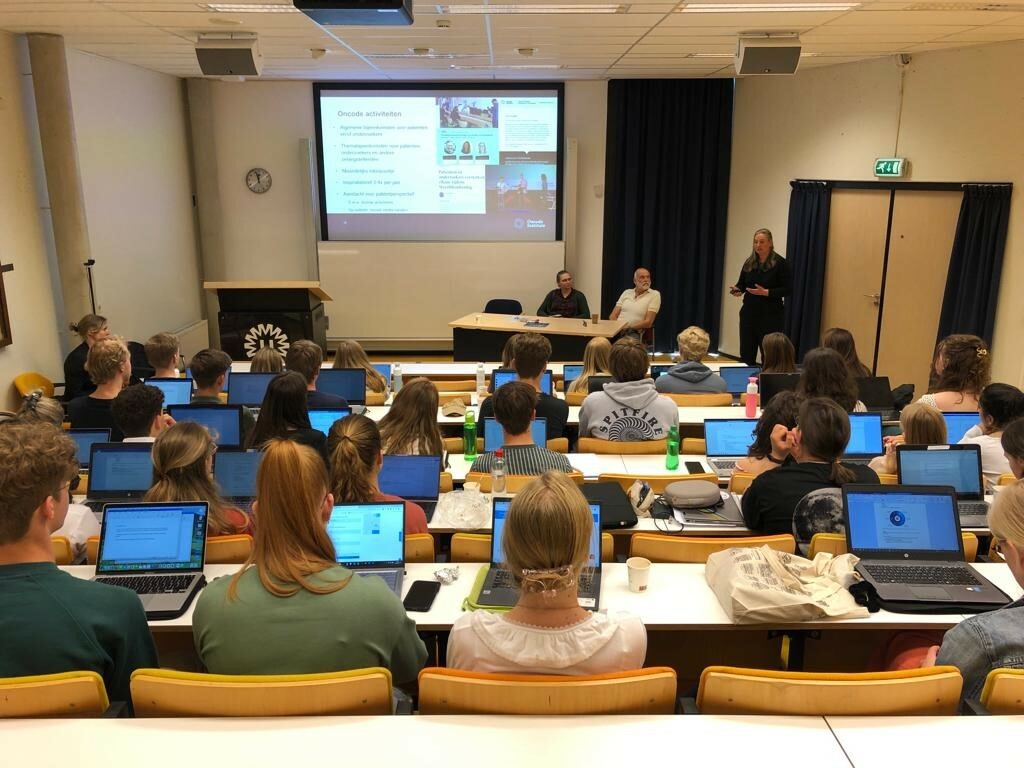Experiencing the impact of your research and knowing how engaging patients in your research can optimize the outcome. These are among the ambitious goals of the bachelor course ‘Eye for Impact’ for biomedical sciences students at University Medical Center Utrecht (UMCU). For the second year in a row, Oncode’s Patient Engagement Programme had the opportunity to contribute to this course as a unique example of how to give substance to patient engagement in basic research. Oncode researchers and patient representatives participated in a series of lectures. During interactive sessions the students experienced first-hand how patients and researchers can partner up. Truly inspirational!
The next generation of scientists is inheriting the responsibility to not only conduct research with good integrity, but also to ensure that new developments benefit society as much as possible, while meanwhile limiting the negative impacts. To do so, it is important to bridge the gap between researchers and patients. “Oncode’s Patient Engagement Programme is contributing to this”, says Colette ten Hove, programme manager at Oncode Institute. “The programme was set up to bring researchers and cancer patients together. By doing so, patients’ experiences and needs inspire researchers, while at the same time their questions on science can be answered. These goals sound great if you put them in a strategy, but practice has proven to be not without challenges. This new way of working requires an overall culture change that is best introduced bottom-up. We therefore think it is important to already discuss the benefits and challenges of involving patients in your research early on in the educational track.”
The course ‘Eye for Impact’ in the biomedical sciences bachelor programme at the UMCU was set up to show students what the impact of their work can have on society. “One of the important aspects of the course is to teach our students that it is important to be open to other perspectives”, says PhD student Elianne Gerritsen, who coordinates the course. “Through interactive sessions with patients, but also with for example, a lawyer, a philosopher and an ethicist, this course will take our students out of the lab bubble. We want that to become normal for them.”
Together, they tell one story
Oncode researchers and patient representatives who are involved in the Patient Engagement Programme, participated in a total of 4 interactive lectures during the ‘Eye for Impact’ which were attended by an average of 40 students each time. Through the lectures, students encountered a duo, consisting of one researcher and one patient. Patients and researchers spoke very openly and personally about their illness and scientific research, respectively. They also shared their experiences with the Oncode Patient Engagement Programme and there was room for students to ask questions.
In these sessions, Oncode researchers Dieuwke Marvin (PhD student Ten Dijke group), Antoinette van Weverwijk (postdoc De Visser group), and Oncode Investigator Peter ten Dijke shared their stories and experiences. Dieuwke says:“Working with patients is very enriching. Not only on a professional level, in the sense that it can provide new insights, but also in a broader sense. It provides (even more) satisfaction and this in turn has a positive effect on my motivation and the pleasure in my work. Driven by curiosity I sometimes stray from the main question of my research. An unexpected result can take me to an important side-track. I think that talking to patients gives me that different perspective and can help broaden your view. This type of curiosity is important in research, but of course focus must be maintained. Antoinette adds: “I really enjoy working with a patient when drawing up the lay summary in a research proposal, for example. A patient has a very good idea of what is and is not understandable and comes across well.” In his session, Peter explained, how a researcher can benefit from the input of patients: “Sometimes you even adapt your research question or method”. He also shared how it motivates him: “Let’s face it, fundamental oncology research in the lab is quite far away from who we are doing it for: cancer patients. It is good to escape the bubble and hear and see the impact of our research”.
For our patient representatives Henk Winkel, Corien de Vries and Inge Reus it has a lot to do with uncovering blind spots in cancer research and inspiring (young) researchers. “Of course, it is emotional for me as a patient to speak about my illness”, Inge reflects on the course, “but I won't stop because of that. In fact, it gives me positive energy afterwards and I was happy to meet such enthusiastic, young, driven students. That gives hope and confidence, instead of fear and despair.”
All in all, the course had impact: students’ view on patient involvement in biomedical research changed from “you must first have good results before telling anyone anything”, and “the patients do not understand what it is about anyway” to the realisation that it is about discussing the process rather than just the end results. A student reacted: “I didn't see the importance of involving patients at first, but after the lecture I did. It is important to involve patients in all steps of your research so that researchers can gain new insights from patients and that patients can gain a better understanding of exactly what research is about.”
Patient engagement at Oncode
Despite all the progress that has been made, there are still many blind spots in cancer research when it comes to including the perspective of patients. Through the Oncode Patient Engagement Programme researchers are stimulated to integrate the perspective of cancer patients into their research. Engaging with cancer patients offers a chance to access first-hand knowledge, and by that, to improve research through novel ideas, perspectives, and discussions. Curious about the ways Oncode involves patients in research? Get into contact with Colette ten Hove to find out how you and your lab can get involved.
